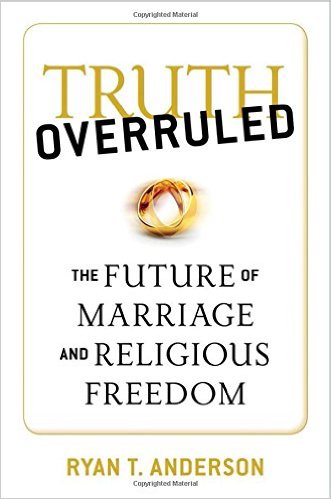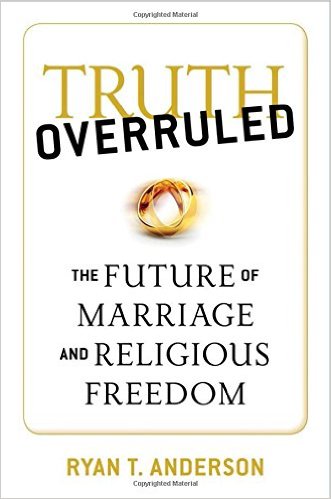Truth Overruled: The Future of Marriage and Religious Freedom

A Denver Journal Book Review by Denver Seminary student Chad E. Graham

Ryan T. Anderson, Truth Overruled: The Future of Marriage and Religious Freedom. Washington DC: Regenery Publishing, 2015. 259 pp. Paperback. $16.99. ISBN 9781621574514.
Ryan T. Anderson, Ph.D., is the William E. Simon Senior Research Fellow in American Principles and Public Policy at the Heritage Foundation, as well as the founding editor of Public Discourse: Ethics, Law, and the Common Good, the online journal of the Witherspoon Institute located in Princeton, New Jersey. Anderson defines “wunderkind” with such a résumé at 33 years old. His research was cited in Justice Samuel Alito’s dissenting opinion on the federal DOMA case in 2013 and again in Justice Clarence Thomas’s dissent to the landmark Obergefell v. Hodges case in 2015. Anderson has quickly become a leading figure in the ongoing national debate on marriage, sexuality, and religious freedom.
Anderson’s previous book, What Is Marriage? Man and Woman: A Defense, co-written with Sherif Girgis and Robert P. George, provides scholarly arguments for the traditional conception of marriage between man and woman. Truth Overruled adds to this work by analyzing the truth about marriage in light of recent federal and state court cases. The book also summarizes the current cultural temperament toward traditional marriage proponents and those seeking to preserve the traditional definition of marriage. This book should be on every pastor’s bookshelf, and it is written so that lay leaders will also benefit.
Many legal and cultural consequences have surfaced in the wake of Obergefell, each caused by the redefinition of marriage, ratified by the majority opinion of the Supreme Court Justices. Anderson suggests that the judicial activism displayed in the Obergefell decision, alongside other recent SCOTUS rulings, signifies a great threat to our republic and a deteriorating separation of powers. By letting nine unelected judges redefine marriage, he argues, the court wields powers never granted by the Constitution. The effect of such activism, in short, is the stifling of national debate over crucial institutions—like marriage. When the Supreme Court decides a case, the decision has great impact on the moral reasoning and beliefs of the country. As Anderson rightly puts it, “The law is a teacher.”
To demonstrate the cost of redefining marriage via judicial activism, Anderson compiles an anthology of different cases involving defendants who were wrongly discriminated against for simply acting on their belief that marriage is between one man and one woman—charity organizations and religious schools, forced to shut down because of court rulings or anti-discrimination laws that restrict the freedom to act according to conscience; bakers, photographers, and other wedding professionals who are forced to pay crippling fines and face mob-like protesters at their front doors—simply for refusing to participate in wedding celebrations. Anderson successfully argues that religious liberty is a basic human right and that governments are instituted to secure such rights; they do this best when taking pains not to restrict religious exercise without “compelling interest.” What compelling interest does the government have in restricting the rights of a baker, who will not bake a cake for a wedding ceremony? The same applies to wedding photographers who employ their craft and participate in the ceremony. In each of the cases Anderson presents, it is established that the business owners did not refuse service merely on grounds of sexual orientation. If the customers wanted any other service not related to a same-sex marriage ceremony, say a birthday cake, the business would be happy to serve them. The business owners declined to bake cakes, take pictures, or facilitate land for ceremonies because they believed it was participating in the ceremony, and they could not do so conscientiously. The courts’ ruling against such business owners chose to protect the “right” not to be offended over the right to free exercise of religion.
The analogy between civil rights and gay rights has become widespread on social media and in university classrooms. This pervasive and false analogy between race and sexuality warrants a whole chapter in the book, and Anderson dismantles it with surgical precision. He rightly chides the flippant use of the labels “sexual orientation” and “gender identity” in legislative initiatives in a time when there is “no scientific consensus on how to define sexual orientation.” In a close-up look at how such laws have affected children raised in same-sex unions, the chapter titled “The Victims” offers testimony against redefining marriage—from persons raised with same-sex parents themselves. It is quite compelling to hear the voices from those who have lived out the reality of having same-sex parents.
In response to the orientation and identity crisis, Anderson issues a call to action, exhorting Christians to become cultural influencers. Anderson envisions truth-telling and winsome Christian conservatives taking up professions such as “scholars, religious leaders, media personalities, journalists, politicians, and more” as a means of rebuilding the broken marriage culture in America. To live out the truth of marriage, Christians need to refrain from engaging in no-fault divorce, flee adultery, and conceive children within the sacred bounds of marriage. As representatives of Christ, and presenting ourselves as his bride, we should be the exemplars of God’s desire for the marriage covenant. Anderson is right to call Christians to repentance and action on this front.
In his final chapter, Anderson calls attention to the early church heresies and how they helped form some of the strongest theological convictions still held today. He does this to encourage believers to see our current cultural decline as an opportunity to galvanize and articulate the truth about marriage in a way that benefits its heirs for the next millennium. This is both brilliant and hope-giving, as it is easy to watch with horror as our culture slides into comfortable moral ambiguity. It is easy for Christians to lose hope and wrongly put their faith in an age-gone-by rather than in the living God, whose truth endures forever. This book energized me in ways no other book has and it certainly filled me with gratitude that people like Ryan T. Anderson are out there, graciously fighting for the truth, with an eye not toward winning arguments but rather hearts and minds for the truth.
Chad E. Graham
Denver Seminary
May 2016
